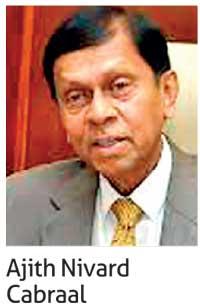11 Jan 2022 - {{hitsCtrl.values.hits}}
Taking a swipe at those who call for the government to default on the upcoming sovereign bond, at a time when the funds are already allocated, Central Bank Governor Ajith Nivard Cabraal said they had now changed their tune after peddling fears for two years for an eventual default, which
didn’t materialise.
 Colombo-based policy advocacy think tank Verite Research’s Senior Economist and Executive Director Dr. Nishan De Mel during the weekend said Sri Lanka should default on its January bond coming up for settlement on the interest of the economy and its populace, who are struggling with the shortages in food and other commodities, due to the heightened foreign exchange crunch.
Colombo-based policy advocacy think tank Verite Research’s Senior Economist and Executive Director Dr. Nishan De Mel during the weekend said Sri Lanka should default on its January bond coming up for settlement on the interest of the economy and its populace, who are struggling with the shortages in food and other commodities, due to the heightened foreign exchange crunch.
But Cabraal, who took to Twitter yesterday, shrugged off these claims in blunt terms, without directly referring to Dr. De Mel by name.
“The individuals who screamed that #SriLanka WOULDN’T be able to #pay the Jan22 #ISB maturity are now screaming that we SHOULDN’T pay it, when WE ARE READY TO MAKE
PAYMENT,” he tweeted.
As Sri Lanka’s foreign currency struggles have exacerbated, with foreign reserves hitting the rock bottom, Dr. De Mel promulgated the idea of a default on the upcoming US $ 500 million bond on January 18, to end the shortages, which are spilling into many sectors and to build economic resilience by rebuilding reserves while engaging with the international creditors for a long overdue debt restructuring.
Dr. De Mel however without directly responding to Cabraal, avoiding a potential tit-for-tat exchange, credited President Gotabaya Rajapaksa’s overture to China for restructuring bilateral debt between the two nations, during the visit of Chinese State Councillor and Foreign Minister Wang Yi.
Cabraal’s comments also included a statement alluding to the merchandise imports by Sri Lanka, which rose to US $ 21.6 billion in 2021, from US $ 16.1 billion in 2020 and US $ 19.9 billion in 2019, which indicated that the country managed to fund higher imports, even amid the foreign exchange challenges.
However, this created a run on the rupee against the dollar and country’s foreign exchange reserves as ultra-low interest rates, which to a certain extent helped to blunt the impact of the pandemic on the economy, kept aggregate demand at a robust level, which triggered higher imports, according to the data.
Now a policy reversal is due to correct the foreign exchange troubles and also to cool down the consumer prices.
Sri Lanka’s foreign exchange troubles date back to decades but it came to a head in 2021, when Sri Lanka lost nearly US $ 9 billion from the tourism trade, another US $ 6 billion from exports and at least another billion dollars from remittances during both 2020 and 2021, due to the pandemic-induced economic tumult.
This is barring the investments, which left the shores of Sri Lanka from both equities and treasuries and what could have received as direct investments, which average about between US $ 1.0 and US $ 1.5 billion a year.
In comparison, Sri Lanka has US $ 4.5 billion worth of foreign currency repayments annually through 2025.
A section of economists, who rang the alarm bells last year of the impending crisis, calling the government to seek early debt restructuring while engaging with the International Monetary Fund (IMF), said their advice fell on deaf ears, as the government chose to pursue a home-grown debt restructure, which failed to bring the desired results. But Cabraal disagrees.
“It was while #SriLanka was under an @IMFNews programme that #ISB stock was increased from $5 to 15 bn while #GDP grew from $79 to 84 bn only, during the 5 yrs 2015-19. That’s one of the serious #economic imbalances that the present administration is rectifying. @CBSL #GoSL,” he said reminding of the nature of the economy the current government inherited back in November 2019.
16 Nov 2024 1 hours ago
16 Nov 2024 2 hours ago
16 Nov 2024 3 hours ago
16 Nov 2024 3 hours ago
16 Nov 2024 3 hours ago